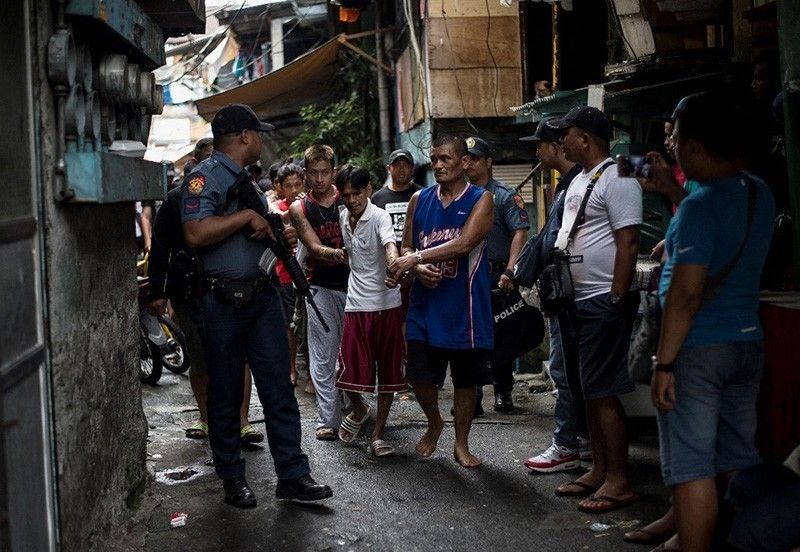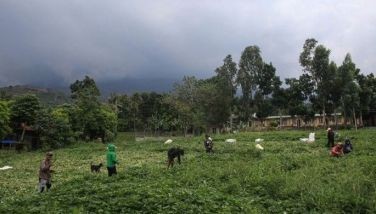Philippines asks ICC to suspend 'war on drugs' probe

MANILA, Philippines — The Philippine government has asked the International Criminal Court (ICC) to suspend its investigation into the killings under the Duterte administration’s bloody “war on drugs” and the alleged Davao Death Squad.
In its 51-page appeal, Manila, through the Office of the Solicitor General, also asked the tribunal’s Appeals Chamber to grant suspensive effect until the resolution of its latest submission and determine that the ICC prosecution is not authorized to resume its probe.
The Philippine government reiterated the argument that the Hague-based court has no jurisdiction over the country.
Although the Philippines no longer recognizes the ICC after pulling out of the court in 2019, the tribunal still has jurisdiction over crimes committed while the country was a state party.
“The prosecution’s activities in furtherance of its investigations would lack any legal foundation and encroach on the sovereignty of the Republic of the Philippines,” the appeal read.
“The resumption of the prosecution’s investigation pending resolution of this appeal would therefore defeat its very purpose and create an irreversible situation that could not be corrected,” it added.
The ICC Pre-Trial Chamber in January granted the request of prosecutor Karim Khan to reopen the inquiry into killings related to the bloody “war on drugs” and the Davao Death Squad.
In February, the Philippines appealed the ICC’s decision to proceed with the preliminary investigation.
Government data show that over 6,000 people were killed in the Duterte administration’s “war on drugs.” Rights groups, however, say that up to 30,000 may have been killed.
Four grounds
The Philippines enumerated four grounds for the reversal of the ICC’s decision to reopen the inquiry into the “war on drugs” and the Davao Death Squad.
Manila claimed that the ICC's PTC “erred in law in finding that the court could exercise its jurisdiction on the basis that the Philippines was a state party ‘at the time of the alleged crimes’ and that the ‘ensuing obligations’ of the Rome Statute remain applicable notwithstanding the Philippines withdrawal from the Statute.”
The government also said the PTC made an error in reversing the prosecution’s burden of proof in the context of Article 18 proceedings, which refer to preliminary rulings regarding admissibility.
“As the moving party, the prosecution bore the burden of proof to establish that the deferral request was not genuine in order for it to resume its investigations. The failure to apply the burden of proof on the proper party vitiates the entire analysis in the impugned decision,” it said.
It also argued that the chamber “erroneously relied on the admissibility test for a concrete case.”
For its fourth ground, the government also claimed that the PTC “erred in its failure to consider all Article 17 factors.” Article 17 of the Rome Statute enumerates issues of admissibility.
Article 17 (1) of the Rome Statute states that the ICC can declare that a case is inadmissible when the “case is being investigated or prosecuted by a State which has jurisdiction over it, unless the State is unwilling or unable to genuinely carry out the investigation or prosecution.”
Article 17 (2) states that the tribunal can also rule there is “unwillingness” by a State if the “proceedings were or are being undertaken or the national decision was made for the purpose of shielding the person concerned from criminal responsibility for crimes.”
Under Article 17 (3),” the Court shall consider whether, due to a total or substantial collapse or unavailability of its national judicial system, the State is unable to obtain the accused or the necessary evidence and testimony or otherwise unable to carry out its proceedings.”
Set up in 2002 to probe the world’s worst crimes, the ICC is a “court of last resort” that intervenes only when countries are unwilling or unable to prosecute offenders.
On Monday, a Navotas court found a former policeman guilty of killing teenagers Carl Angelo Arnaiz and Reynaldo "Kulot" De Guzman during the “drug war”, a rare conviction for one of the campaign’s enforcers. The case — which took more than five years to resolve — is, however, only the second known murder conviction of police officers amid thousands of recorded cases of killings in "drug war" operations. — Gaea Katreena Cabico
- Latest
- Trending


































